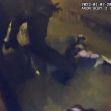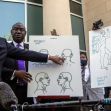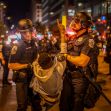Several legal non-profit organizations have come together to establish an International Commission of Inquiry on Systemic Racist Police Violence against People of African Descent in the United States. The Commission will take a closer look at police violence against African Americans after a growing number of cases made national headlines over the past couple of years. The Commission of Inquiry was established in part by the National Conference of Black Lawyers (NCBL), the International Association of Democratic Lawyers (IADL), and the National Lawyers Guild (NLG).
The push for investigating police violence against African Americans was spearheaded by the U.S. Human Rights Network and the ACLU along with 600 other organizations. Together, these groups urged the U.N. Human Rights Council (HRC) to assemble a Commission of Inquiry regarding systemic racism and police brutality toward the African American community. Following the proposal, ACLU’s human rights program director Jamil Dakwar explained that the HRC decided not to assemble an inquiry after the Trump administration pushed back with intense lobbying. Dakwar explains of the HRC’s decision, “The outcome is a result of the pressure, the bullying that the United States did, assisted by many of its allies.” The HRC did however pass a resolution in June 2020 condemning police violence against African Americans.
As part of the resolution, the HRC mandated that an official report be put together by the High Commissioner for Human Rights Michelle Bachelet. The report will specifically address “systemic racism, violations of international human rights law against Africans and people of African descent by law enforcement agencies, especially those incidents that resulted in the death of George Floyd and other Africans and people of African descent, to contribute to accountability and redress for victims.”
Because the Commission of Inquiry was not put together by the HRC, these legal nonprofit organizations came together after the U.N. High Commissioner called for input from nongovernmental organizations. Bachelet is tasked with finalizing and presenting the report by June of 2021. In addition to mandating a report, the HRC has allowed the Commission of Inquiry to have free reign as far as the subject matter goes.
Lennox Hinds, one of the main proponents who gave life to the Commission, shared in a statement, “This International Commission of Inquiry is an attempt to give voice to the international outrage resulting from the public lynching of George Floyd and to expose the racist and systemic nature of police violence against people of African descent in the United States and to hold the U.S. government accountable before the international community."
Diverse Panel to Make up Commission
The commission is made up of a diverse group of experts in human rights from around the world. The commission is composed of lawyers, professors, judges, and human rights activists from India, Barbados, France, Costa Rica, Pakistan, South Africa, Jamaica, Nigeria, Antigua and Barbuda, Japan, and the United Kingdom.
The Commission plans to hold hearings starting January 18th that will run through February 6th. These hearings consist of at least 50 cases that address systemic racist police violence inflicted on African Americans throughout the United States. The cases that will be heard include many recent ones such as those of George Floyd, Breonna Taylor, Eric Garner, and Tamir Rice. However, other cases will date as far back as 2010.
All of the cases will be conducted online via Zoom, and once each case is heard, the findings will be presented to the U.N. High Commissioner and compiled in the report. Once the report is finalized, it will be available to the public.






